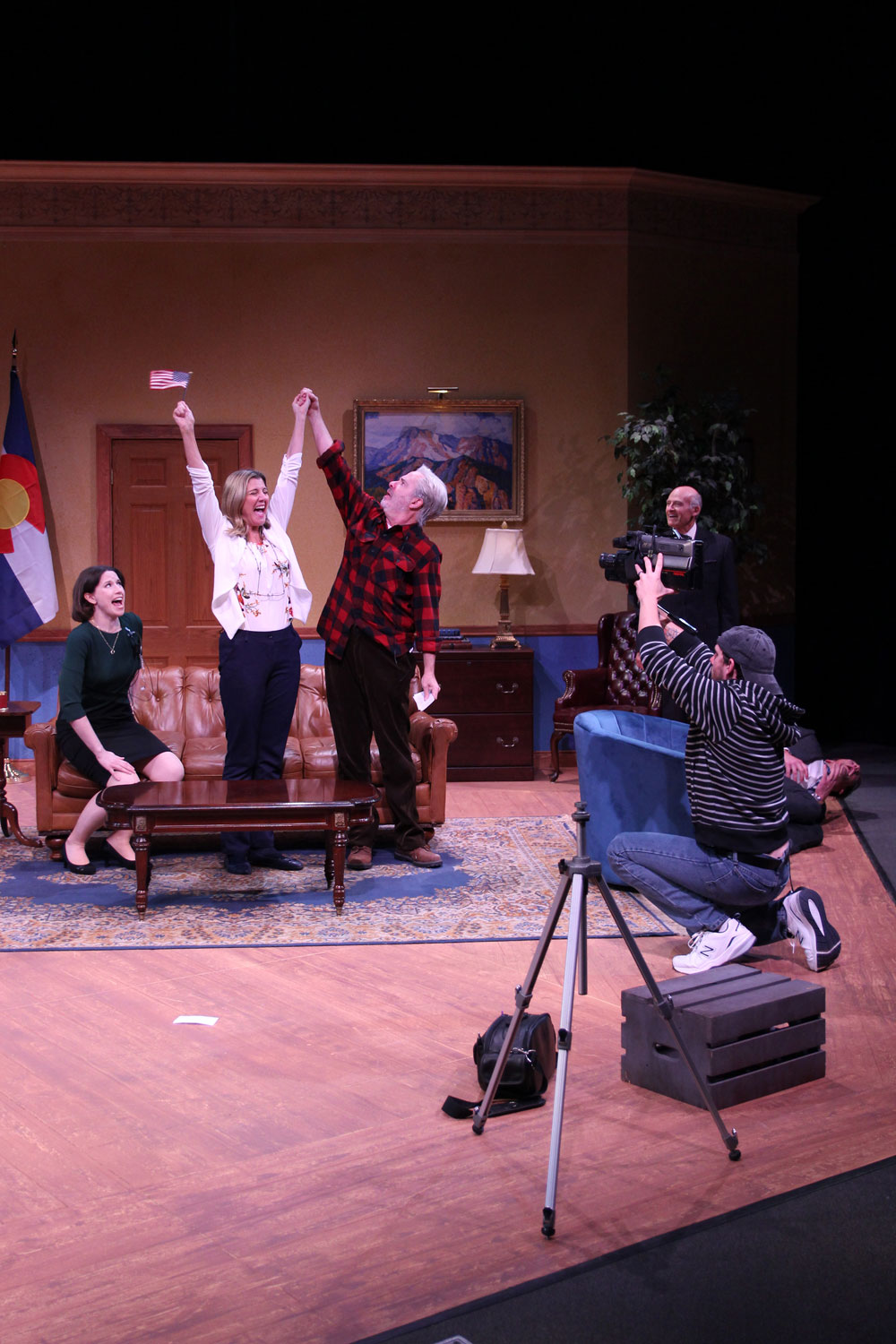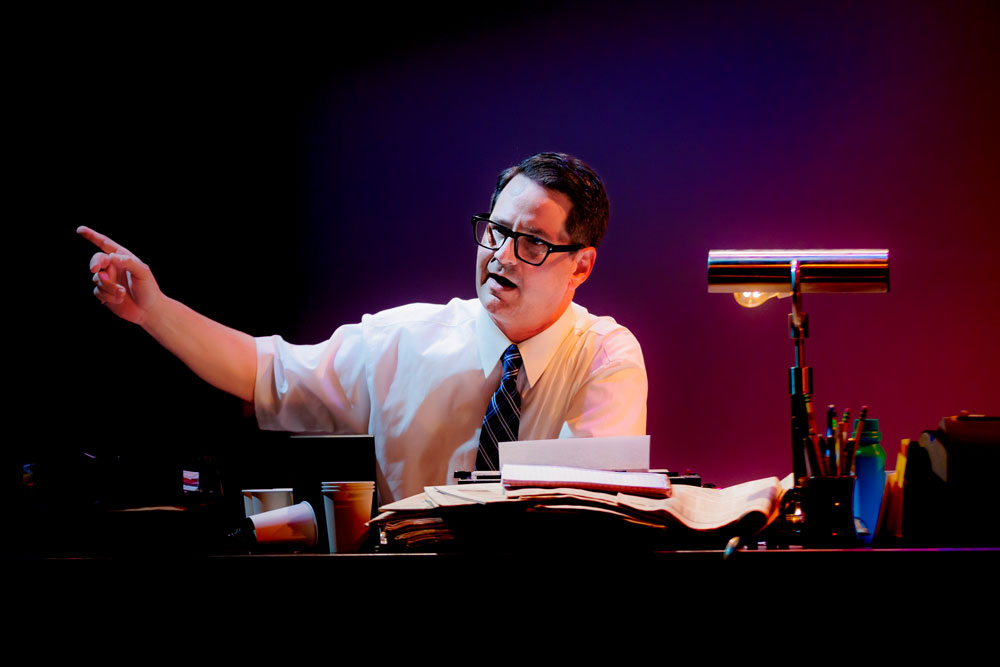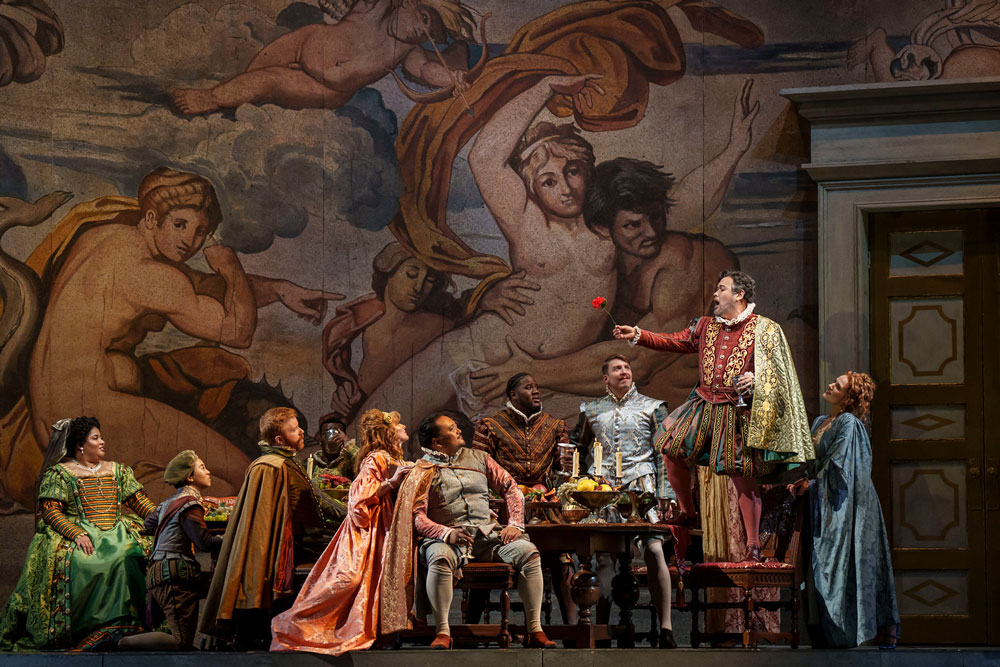
Innocence, youth and love can seem the perfect ingredients for romance. But as Giuseppe Verdi’s 173-year-old opera Rigoletto reveals, they can also combine to create a tragic cocktail for disaster. Lyric Opera opened its new season Saturday night with this most enduring of opera classics. One that owes its longevity as much to the mysteries it refuses to release as it does to its extraordinarily beautiful composition.
Based on Victor Hugo’s controversial play, Le Roi s’amuse (The King Amuses Himself), Verdi clearly had a sense of the work’s operatic potential. Believing that the poignancy of his plight achieved Shakespearean dimensions, Verdi was particularly drawn to the character of the court jester, Tribolet. Adapting Hugo’s work to opera though would not be a simple matter. Because Le Roi s’amuse satirized the monarchy, it was banned in France and Verdi knew he could easily face similar censorship if he presented it as originally conceived. Refocusing the title to the jester, in this case Rigoletto, and substituting a duke for a king, he was able to stage Rigoletto to immediate and resounding acclaim. With two of its leads making their Lyric debuts, this weekend’s Lyric performance of Rigoletto glowed with all the attributes that make it as appealing now as it was in 1851.
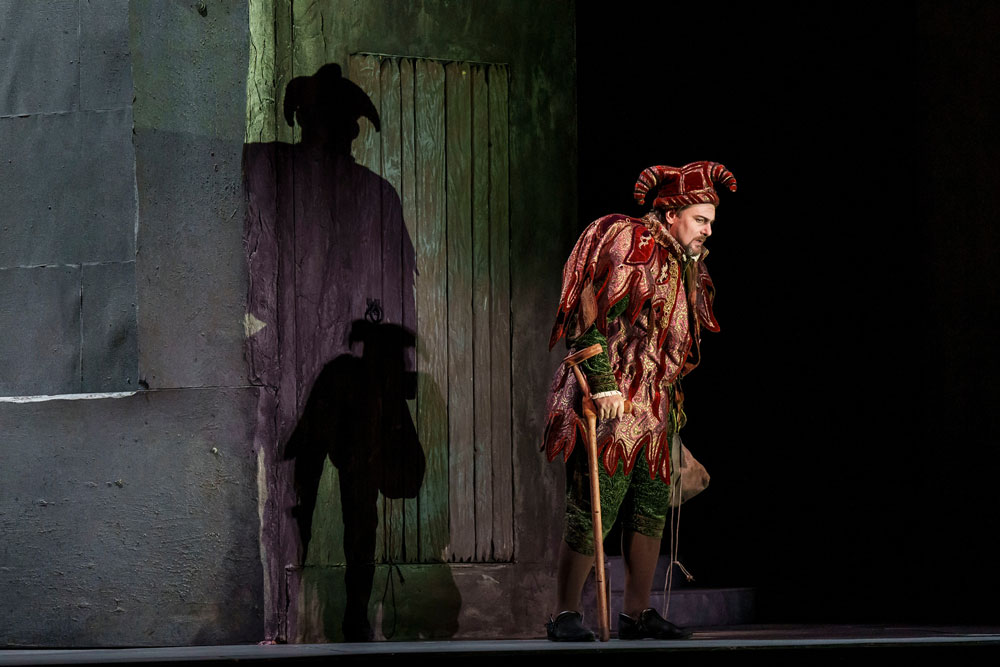
Three figures dominate this window into 16th century Italy. The Duke of Mantua, a playboy who doesn’t let already being married disrupt his flow. Rigoletto, his court jester, and Gilda; the teenaged daughter he has sequestered away from the court and the world. Robert Innes Hopkins’ magnificent set, alternately shifting from the beautifully austere to the imposingly grand, paints an evocative and mesmerizing picture of the times. It also sheds valuable light on the cultural ethos that pervaded them.
Brazen in his flirtations and amorous liaisons, the Duke, blithely played and wonderfully sung by Javier Camarena in his first Lyric appearance, is joyously heedless in his indiscretions. And as his court jester, Rigoletto (Igor Golovatenko) defends the duke’s impulsiveness with women by ridiculing their husbands and fathers. One of them, Monterone (Andrew Manea), whose daughter has been dishonored, curses the Duke. When Rigoletto cruelly mocks him in his distress, Monterone denounces and curses Rigoletto as well. Verdi commonly used curses as devices in his operas and the weight and significance of this one would prove particularly prophetic.
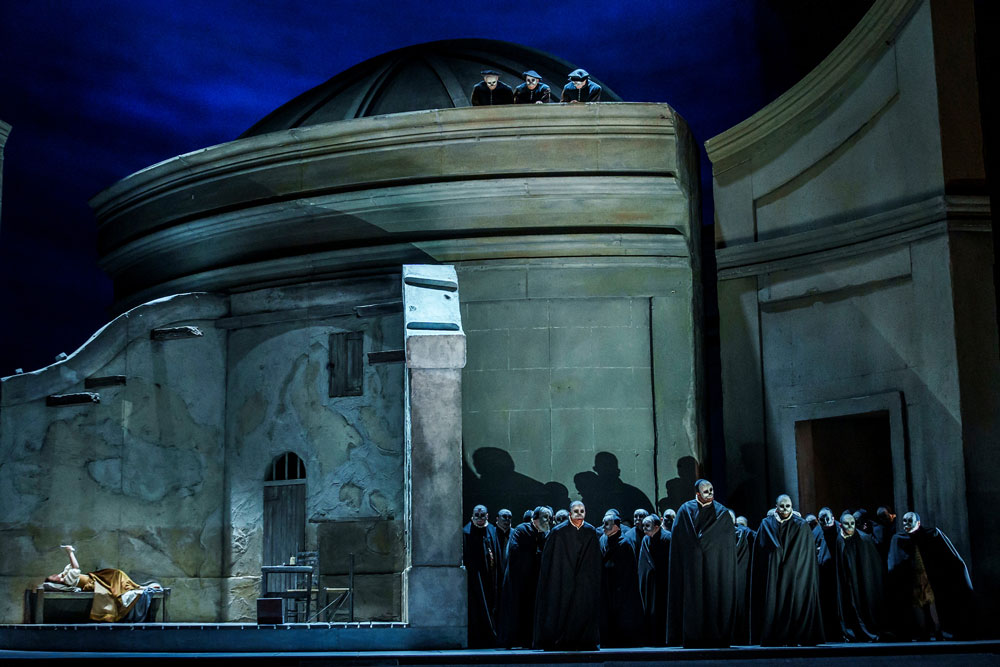
Operatic plots can be dense. And although the one surrounding Rigoletto is involved, its thread is easily followed. Much of that clarity can be credited to Francesco Maria Piave, the librettist who wrote the opera’s musical script and lyrics. Piave has an exquisite touch with language and fills his words with simplicity, depth and emotion. They’re like arrows that pierce our understanding with stunning immediacy and resonance. Delivered in song, their power is both enhanced and charged by Verdi’s incomparable music.
Although young, the Duke knows the world and uses his position and his looks to manipulate it; especially its women. Rigoletto knows this and that knowledge is one of the reasons he’s taken such care to hide and protect his daughter. Others at court know he’s keeping a secret; but they think he’s hiding a mistress. As cautious as he is, he can’t completely shield Gilda from outside influences. She can go to church and that’s where Gilda and the Duke see one another. She’s smitten by his appearance. He sees a possible conquest and pursues her with stealth and then deceit. Eavesdropping, he learns of her simple wishes from love and tells her he’s a poor student before declaring his love for her. Rapturous, their duet, É il so Dell’ anima brims with compelling earnestness. Mané Galoyan in her Lyric debut playing Gilda is magnificent throughout and you can detect that inner will that Director Mary Birnbaum wanted to emphasize in this depiction of Gilda. When the Duke leaves and she’s alone singing one of the opera’s defining arias, Caro nome, you’re reintroduced to what unrestrained infatuation looks and feels like on a euphorically grand scale. Galoyan’s treatment of the piece is superb.
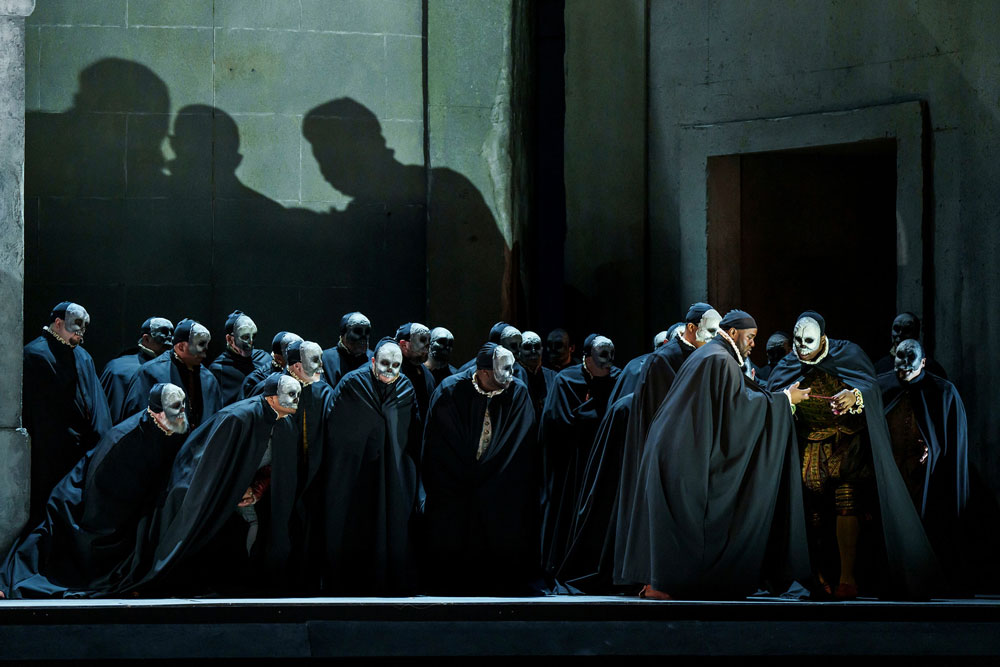
Her father, Rigoletto, knows nothing of these developments. But he has discerned that his influence in the court has turned tenuous. Courtiers have spurned him and abducted his supposed mistress, Gilda; delivering her to the Duke. Rigoletto’s eventually reunited with his daughter but the sequences leading up to their reunion point to why Verdi may have been so moved by the jester’s plight. His lamentations when he discovers Gilda’s disappearance is wrenching. And when the courtiers turn their backs on him when he begs for their help, you grasp the magnitude of his personal isolation. By this point, Golovatenko has fully consumed his role as Rigoletto. He becomes a transfixing figure as he sings Cortigiani, vil razza dannata with such devastating misery.
Gilda confesses to her father that she loves the Duke. He knows the Duke doesn’t, can’t, love her. And even when he proves that to Gilda by letting her hear him seduce another woman, she’s remains resolute in her feelings. Filling her unexperienced heart and mind with words like, “I have no need for paradise with you by side”, Gilda is convinced of his sincerity. Desperate, Rigoletto hires the assassin, Sparafucile (Soloman Howard), to kill the Duke. Even when sparsely present, Howard’s lushly sonorous bass seems to memorably embellish any production; as it does so well here.
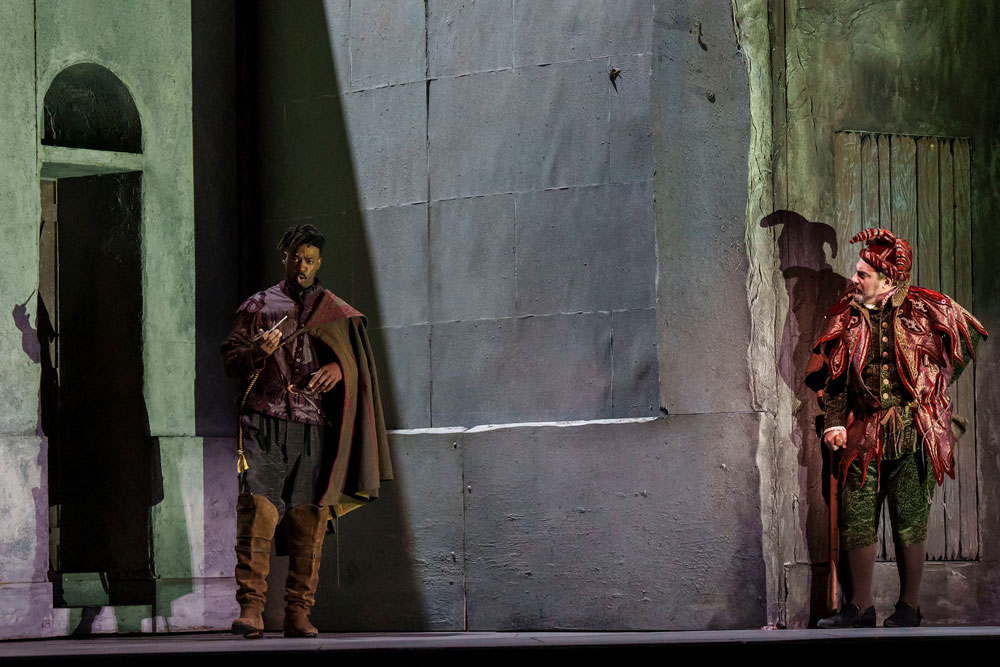
Sparafucile’s sister, Maddelena (Zoie Reams), is the woman Gilda overheard the Duke attempting to woo. She wants her brother to spare the life of the man she calls more beautiful than Apollo. Gilda’s decisions and actions make that unnecessary and leads to a quandary that Rigoletto instigated almost 200 years ago and one that will continue for 200 more. Why does Gilda, or anyone, sacrifice themselves on the altar of love? It’s a question that couldn’t be posed more beautifully than in this sumptuously produced masterpiece.

Working brilliantly to create a setting hundreds of years removed from the present, Duane Schuler’s lighting design gave Hopkins spectacular sets palpable atmosphere and gravity. Often called the King of Opera, Verdi’s music, under the masterful baton of conductor Enrique Mazzola, was characteristically intricate and sublime in its colors, beauty and power.
Rigoletto
Through October 6, 2024
Lyric Opera of Chicago
20 N. Wacker Drive
Chicago, IL 60606
